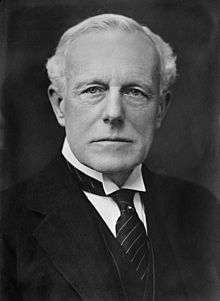Willoughby Dickinson, 1st Baron Dickinson

Willoughby Hyett Dickinson, 1st Baron Dickinson, KBE, PC (9 April 1859 – 31 May 1943), was a British Liberal Party politician.
Dickinson was the son of Sebastian Stewart Dickinson, Member of Parliament for Stroud. He was educated at Eton College and Trinity College, Cambridge.[1] He served as vice-chairman of the recently formed London County Council from 1892-1896 and then its chairman from March 1900 to March 1901.[2] He was Member of Parliament for St. Pancras North from 1906 to 1918 and was an assiduous supporter of women's suffrage, promoting a number of measures in Parliament to get the vote for women.[3][4][5][6] Dickinson was made a Privy Counsellor in 1914 and in 1930 he was raised to the peerage as Baron Dickinson, of Painswick in the County of Gloucester.
He was later secretary-general of the World Alliance for International Friendship, and from 1931 chairman of its International Council.[7]
Family
He married Elizabeth, daughter of General Sir Richard John Meade,[8] in 1891. They had three children, one of whom was Frances Joan Dickinson, Baroness Northchurch. Lord Dickinson died in May 1943, aged 84, and was succeeded in the barony by his grandson Richard, his only son the Hon. Richard Sebastian Willoughby Dickinson having predeceased him. Willoughby Dickinson's sister, Frances May, an anaesthetist, was the first wife of surgeon Sir James Berry.[9]
Notes
- ↑ "Dickinson, Willoughby Hyett (DKN877WH)". A Cambridge Alumni Database. University of Cambridge.
- ↑ "London County Council". The Times. 14 March 1900. p. 3.
- ↑ http://hansard.millbanksystems.com/commons/1907/feb/15/womens-enfranchisement-bill-1#S4V0169P0_19070215_HOC_21
- ↑ http://hansard.millbanksystems.com/commons/1908/feb/28/womens-enfranchisement-bill-1#S4V0185P0_19080228_HOC_73
- ↑ from March 1907 to the Representation of the People Bill of 1913. During World War I the Speakers Conference on electoral reform included two influential Liberal suffragists, Sir John Simon and W. H. Dickinson, who helped ensure that it recommended granting the vote to women.
- ↑ Summary of 1912 Conciliation Bill debate; Dickinson quoted as, I regard this question of the women's franchise as part of the movement of civilisation.
- ↑ Mentioned in Nobel Peace Prize speech 1930, by Nathan Söderblom.
- ↑ Lundy, Darryl. "p. 7400 § 73997 - Person Page 7400". The Peerage.
- ↑ http://livesonline.rcseng.ac.uk/biogs/E003832b.htm
References
- Kidd, Charles, Williamson, David (editors). Debrett's Peerage and Baronetage (1990 edition). New York: St Martin's Press, 1990,
- Leigh Rayment's Peerage Pages
- Leigh Rayment's Historical List of MPs
- Lundy, Darryl. "FAQ". The Peerage.
| Political offices | ||
|---|---|---|
| Preceded by Lord Welby |
Chairman of the London County Council 1900–1901 |
Succeeded by Andrew Mitchell Torrance |
| Parliament of the United Kingdom | ||
| Preceded by Edward Robert Pacy Moon |
Member of Parliament for St Pancras North 1906 – 1918 |
Succeeded by John William Lorden |
| Peerage of the United Kingdom | ||
| New creation | Baron Dickinson 1930–1943 |
Succeeded by Richard Clavering Hyett Dickinson |